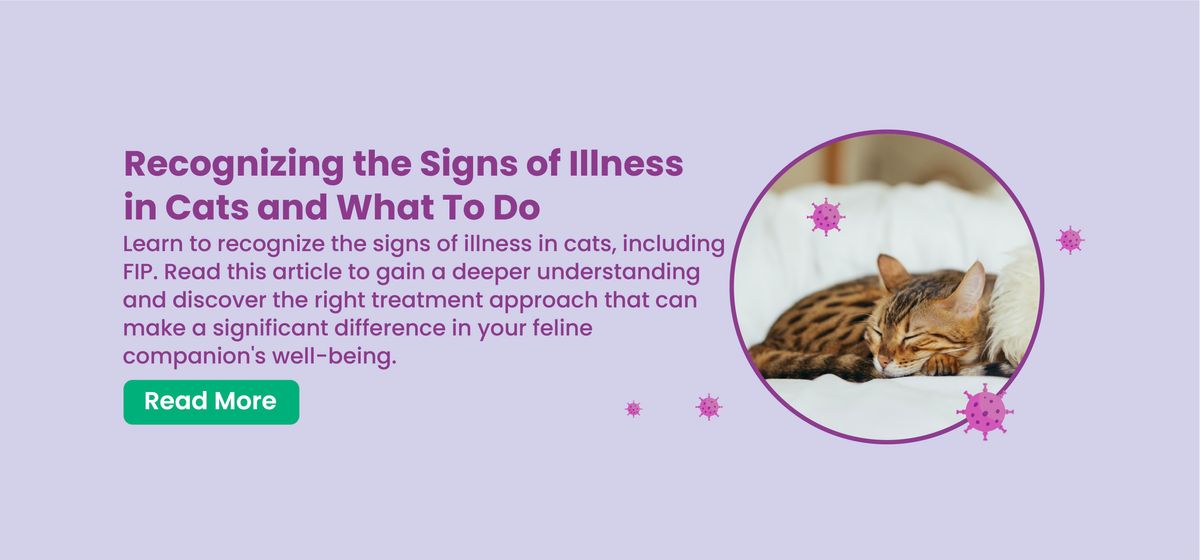
Just like many other animals, cats are very clever at hiding their discomfort when they're sick. In fact, signs of illness may not be clearly visible until your cat's health deteriorates significantly. In the early stages of a cat falling ill, often the only thing Cat Pawrents might notice is their cat becoming quiet and not as active as usual.
At this stage, it is essential to schedule a check-up with the vet to understand what's really happening with your cat. Veterinarians can observe signs that indicate the cat is experiencing health problems.
Knowing When Your Cat Is Sick
As Cat Pawrents, you understand your cat better than anyone else. So, it's important to pay attention to your cat to notice changes in behavior that might go unnoticed by others and monitor any changes in your cat's usual behavior or body language. If something seems off, schedule a check-up for your cat, even if you don't see the symptoms mentioned above.
What should I watch out for?
Sick cats typically show changes in overall appearance, appetite, energy levels, sociability, fur appearance and/or shedding, litter box usage, breathing, or presence of discharge from the eyes or nose. Generally, any sudden changes should be a warning that your cat requires the attention of a veterinarian.
Signs of a Sick Cat to Be Cautious About
By understanding how cats show signs of illness, you'll be able to recognize early warning signs and know what information to provide to the veterinarian. That's why it's important to visit the vet as soon as possible if you notice any of the signs or symptoms of illness mentioned below:
Changes in Energy Levels and Behavior
Is your usually very active and playful cat suddenly hiding and not engaging in any activities? Behavioral changes like these could indicate an underlying issue. And don't disregard the possibility of your cat turning into a sudden hyperactive. On the other hand, difficulty moving or jumping can be signs of potential joint problems.
Changes in Fur Appearance and Shedding
Cats are known as pets with excellent grooming skills. However, if your cat's fur becomes messy and oily, or you see tangled fur, it's a clear indicator that further investigation is necessary.
Changes in Appetite
If your cat, typically an enthusiastic eater, begins to show disinterest in food or laziness towards eating, it's a red flag. A decreased appetite is a notable sign that something might be amiss with your beloved furry friend.
Changes in Breathing
While cats are known to be composed breathers, observing shallow breaths or panting warrants attention. Unusual sleeping positions, frequent sneezing, or coughing could also signify respiratory issues and should prompt a visit to the vet for assessment and care.
Signs of a Sick Cat Leading to FIP
Among the previously mentioned signs, certain symptoms can indicate that your cat is suffering from Feline Infectious Peritonitis (FIP), a severe and often fatal disease in cats known for its high mortality rate. If your cat shows several FIP symptoms such as fever, lethargy, decreased appetite, balance disturbances, unusual abdominal enlargement, ocular symptoms, jaundice, anemia, and the cat is experiencing stress, it's crucial to promptly schedule a check-up with the vet to detect the presence of the FIP virus in the cat's body.
Read also: Understanding the Signs of FIP in Cats
What to Do When a Cat Is Affected by FIP
To determine the presence of the FIP virus in the cat, a medical examination is highly recommended to enhance diagnosis. For detailed information, you can refer to our article about 5 Types of Examinations that Can Be Done to Diagnose FIP in Cats.
After the cat is diagnosed with FIP, the next thing to do is consult with the Basmi FIP team to determine the appropriate type and dosage of treatment. You can contact Basmi FIP by clicking WhatsApp Basmi FIP here.
FIP is a serious disease, but early detection can help improve the chances of a positive outcome. If your cat is showing symptoms of FIP, take them to your nearest veterinarian for proper diagnosis and treatment. If you have any questions or concerns about FIP and its treatment, don't hesitate to contact us on WhatsApp or visit our Instagram for more information.



